March 23rd 2015. I was in the library, spring-cleaning my laptop. It was the start of the Spring break. When I was cleaning the laptop, past memory was reminiscing itself. Then I logged into my Ask.FM account, checking the questions that I could answer, and I found the questions about biotechnology, like “what about the job in the future?”, “what is biotechnology”, “what you learn in biotechnology”, et cetera.
Right this moment, the memory that I was reminiscing converged to a point in which I began to jog my brain why did I choose biotechnology as my field for undergraduate study.
January, year 2012. I was walking back home from my workplace. I just graduated from high school, and I wanted to find some pocket money for myself, and occasionally treating lunch for my parents. Once I took a different alley than usual, taking a stroll to enjoy the simple pleasure that life offered. Along the alley, I looked at the street lamps and the fences. I found pamphlets and posters glued to the poles. Squinting my eyes, all the pamphlets and posters were about the information on tertiary education, information on different fields of study, and stories from some college and graduated students.
Some of them were too high. I jumped, tried to grab the pamphlets and posters. The effort ended to no avail, but the energy I mustered finally had harvested itself after I got a bagful of them. But it didn’t end there. I wanted to analyze all of them. I wanted to make informed decisions that could affect my life in the long run.
“Wait, what are you trying to say here bro?”
A minute, please. My story isn’t quite there yet.
Fast forward, 3 years later. I visited my high school, gave a talk to the graduating students. I told them that one evening about 3 years ago I walked on a narrow alley and I found a lot of pamphlets and posters, and I grabbed them, and I analyzed them thoroughly, and eventually it brought me to a new height in my life. All the inspired faces made that impression akin to applauding, their hands close to bang a unison thunderous applause but they couldn’t seem to be able to do so because they were so mesmerized listening to my story.
The next evening when the dusk and twilight were dancing together in a waltz, I took a stroll on the same alley like I did 3 years ago. Just before that, I decided to watch all the graduating high school kids playing soccer. The dusk was a signal for them to come home and to have dinner with their families. They seemed to remember the alley and that I told them about, but there was one thing that surprised me, brought me to my knees. I was horrified, regurgitating the content of my stomach, close to vomit, unable to move, and my teeth shattered by my trembling body.
I watched them from afar, behind them.
Once they arrived at the junction of the alley their legs limped. They tried to move by pushing their bodies forward with their hands, but it looked like their hands suffered from paralysis. I swore to God I just saw that kids playing soccer, and even I saw some of them did a somersault to score the points. They screamed. Oh my god, they screamed so loud the earth trembles in fear.
I ran to the nearest clinic to get a wheelchair. I came back to the alley with a wheelchair, and I seated one of the kids on the wheelchair, pushing it along the alley. Then I was taken aback. The moment he sat on the wheelchair, his legs and hands were healthy again, and out of nowhere he summoned an electric guitar and started singing songs like a frog. I told him, “hey kiddo, grab a pamphlet or two, and read them.” Out of the blue, that electric guitar exploded, and his hands were burned by a flame that I didn’t know where it came from, and he screamed again. I climbed the fences and poles (feeling like a thief), grabbing the pamphlets and posters for him, and I push him to the end of the alley, and he was healthy again, scampering back home with a bag of pamphlets. I did the same thing to the rest of the kids, over and over again
And the night of the same day, the kids called me. Again, I was horrified, head turned pale. They asked me to come to their house, and to teach them how to read the pamphlets and posters. I complied. I felt compelled to help this new generation, because they were our hope to bring this country into prosperity.
But, again, I was horrified beyond what a horror would give me a goosebump, the moment I started reading the contents of those pamphlets, they snored. Once I stopped reading it, abruptly their snoring stopped, asked me to read the rest of them.
The horror turned into hatred. I reduced their houses into wood, fire, and ashes. I walked home, and instead of going to bed I stayed up late in my lab, inoculating plates of bacteria.
And the next day, I was convicted of committing arson.
introduction
Pardon my lengthy prologue, but I hope you get my points right. I am more than happy to help the high school students to find their career path. Seeing the kids that I mentored to be someone with towering skills and personality is one of the principle joys of my life, seeing my blood (bleeding gum, not menstruation) and sweat molded a kid being the next Aizan (wait what?) is my chocolate cake and candies.
“Aizan, explain to me a little bit about your story above.”
Sure why not. The alley is the internet. Back in 2011 and 2012, I was using the internet excessively and extensively to read and read and read again. I redundantly typed “read” thrice to emphasize how important it is to read. Also, spend a lot of time to understand, and synthesize your own analysis and opinion. Back in 2012, I still remember that I spent about 2 or 3 months just to understand the breakthrough of the year, the Higgs Boson, dubbed as the god particle1. The story above is about my frustration. My friends (notably Syaza Nazura) and I spend time to answer questions that you would find the answers on Google, but we want to make it easier for you, believing that you guys will improve over the time instead of being totally reliant on our effort to solve your issues. We are there to help, not to find you a wheelchair, to push you along the alley, and to grab the pamphlets for you.
Don’t you think it is ridiculous? Because I think it is ridiculous.
And before I burn down another house, let’s proceed with the story about “biotechnology”.
can I sleep?
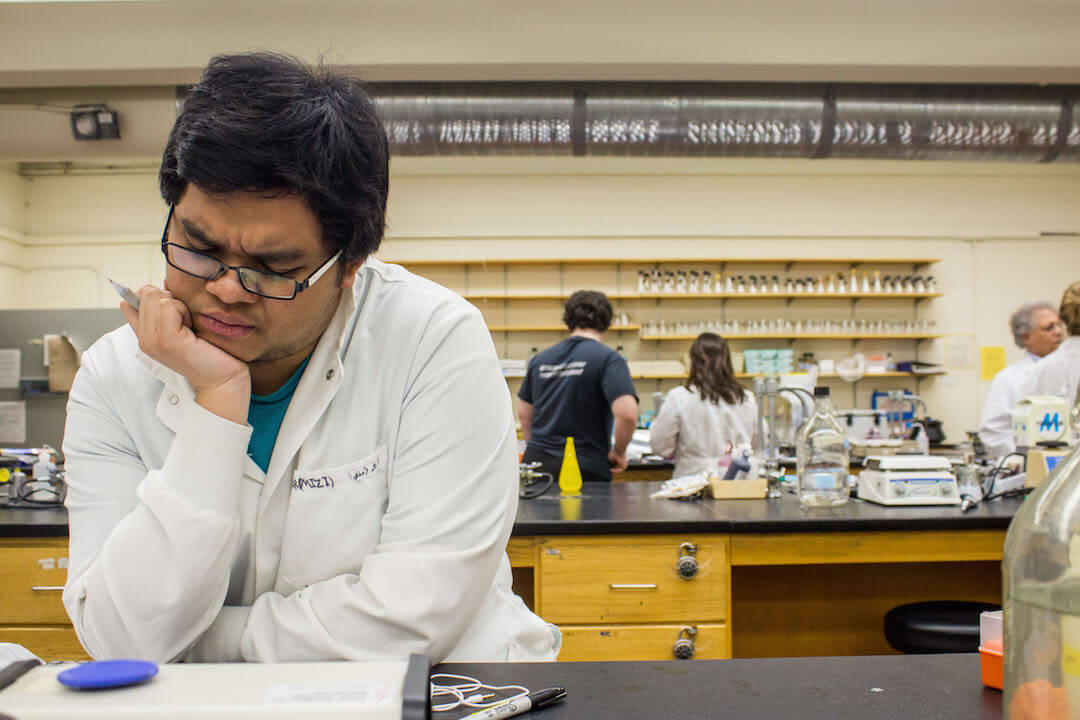
“Is biotechnology hard? I like biology, but back then when I was in high school I had to memorize a lot, and I don’t know if I could do this.”
Run. Run for your life. This field is like a coconut. You want to drink the coconut juice, but at your disposal you only have a nail clipper, a pencil, and bunch of toothpicks. How are you going to crack the coconut if you only have those three tools?
Okay kidding. It is not that hard. Surely it has its own challenges.
First and foremost, I don’t quite like it when people come to me and ask “is it hard?” because I tend to answer sarcastically, just like what I did above. I prefer you to ask it “is it challenging?”, then we can sit for a coffee talk. The challenge, of course, is to read hell a lot and to do experiments hell a lot. This field is often associated with wet experiments2, for example, growing bacteria, growing tissues (tissue culture), modifying the genetic elements of the bacteria, growing up viruses, and a lot of experiments with wet stuff. Doing wet experiment is challenging, because sometimes you can’t really predict how the bacteria would behave, and sometimes you have the repeat the experiments again and again to draw a conclusive result.
When it comes to any hard science3 field, it demands buttload hellish volumes of reading. And not just read, but to understand and to analyze, and to form opinion around what you’ve read, and to synthesize new ideas and concepts based on what you’ve read. Hard science fields are all about innovation. To simply summarize it, hard science fields teach you this dogma: “comprehension, decomposition, and reassembly”. You comprehend the materials, you break it down pieces by pieces, then you glue them back differently, creating something new.
In short this field is hard at some points, but brace it. Don’t be a wuss. What doesn’t kill you makes you stronger, and you don’t want to get killed just by majoring in biotechnology.
To reuse my analogy above, you can still get the coconut juice with a pencil, a nail clipper, and a toothpick. Use the pencil to design a billboard, and with the nail clipper you just advertise to the public that you are an expert in manicure and pedicure. People with extra money to spend will come to your parlor, and that’s where you activate booby trap with toothpicks you have, rob them, and now you have money to buy coconut juice at any supermarket, and in fact you can buy the coconut juice in bulk.
“Wait what?!”
the central dogma of molecular biology
The field of biotechnology didn’t come out of the thin air. There must be an event (or series of events) that triggered the birth of this field. We’ll look into several perspectives that define the advent of the biotechnology so that we can see what this biotechnology field does to our life, and in what way it gives impact to humankind.
Let’s get started with this statement first: I’d say that this field is the engineering version for pure physics.
“What do you mean by that?”
If you are majoring pure physics, it means that you are learning the theories of physics that govern our universe. The knowledge that comes from this field is then utilized by the engineers to produce machineries, to devise systems, and to create equipments. The theories of transforming energy from one state (e.g., liquid fuel) to another state (e.g., force in the form of controlled explosion) gave birth to combustion engine, made possible by the engineers based on the knowledge discovered by the physicists.
By applying the logic above, biotechnology is the applied version of the molecular biology, the biology that deals with interaction of molecules, from the tiniest interaction between molecules of DNA to the products like cereals from genetically modified wheat.
From the historical perspective, the inception of biotechnology began at the dawn of genetic engineering circa World War 1. This dawn was focusing on the production of consumable, which was the brewing techniques for beer4. Just before that, what is genetic engineering? It is about direct manipulation of an organism’s genetic materials (the DNA), in order to improve its performance to produce certain molecules, to give it new functions, or to make it more resilient in some cases.
“How we make it possible, to give an organism a new function?”
We call it the recombinant DNA technology, i.e., a technology to create genetic instructions, and then incorporating the instructions into the organism of interest, giving it a new function, which is otherwise won’t be found in nature. So to define biotechnology based on the points above, this field is concerned with the genetic modification of organism’s genetic materials, by using techniques such as recombinant DNA technology, and is best perceived as the engineering in the world of biology.
I think this definition is precise and concise enough, but let’s dig deeper.
unabridged and conclusive
Now that you’ve come this far, thus I must congratulate your effort, but I have to continue writing this (in agony, mind you). Why? Because there is awesomeness in being a reader, and being a reader alone is not enough, for one that has to transcend from just being a reader into being a researcher, and then being a researcher would elevate you into a higher plane if you care about others, then you become a writer, producing reading materials for people to consume.
First thing first, you have to be a reader. A choir of angels write a hymn exalting your superiority to the rest of humanity if you read, and read a lot. See how reading a lot of things makes Azmeer a happy boy.
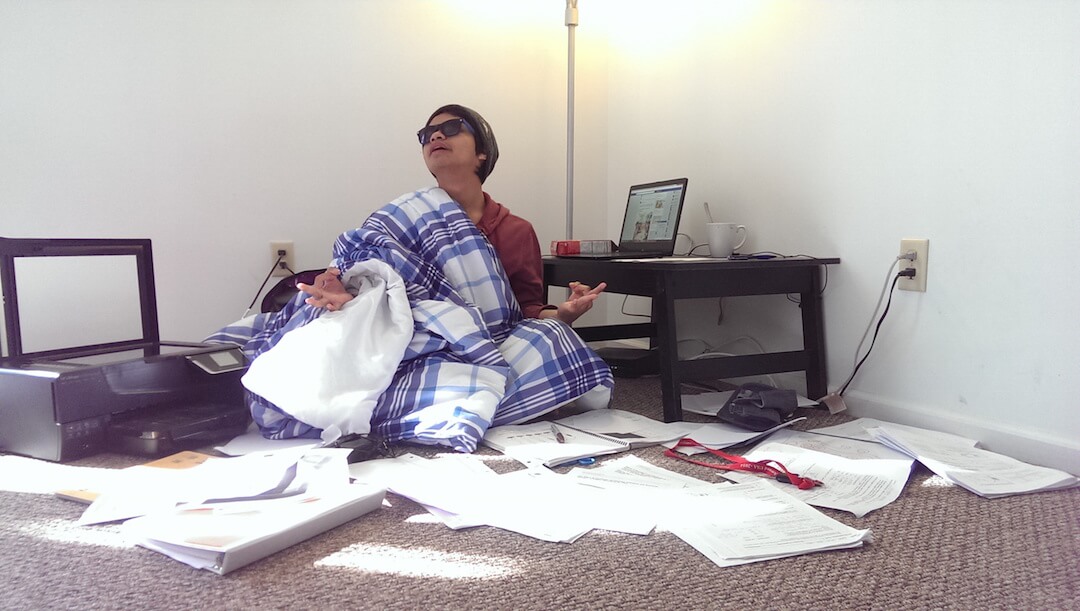
In the previous section, we’ve agreed that the field of biotechnology can be defined as “a field that is concerned with the genetic modification of organism’s genetic materials, by using techniques such as recombinant DNA technology, and is best perceived as the engineering in the world of biology,” but that doesn’t tell the whole story of this field. First and foremost, let’s break the term ‘biotechnology’ down into two parts: biology and technology.
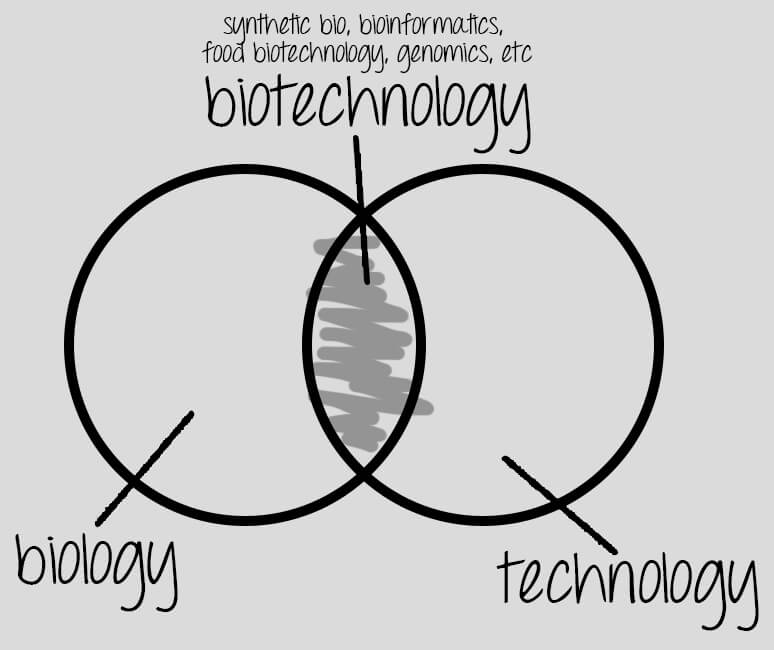
From Wikipedia, biotechnology is defined as “any technological application that uses biological systems, living organisms or derivatives thereof, to make or modify products or processes for specific use 5.” We’ve cracked its definition, so now let’s go even deeper. What if I told you “biotechnology is a general, non-specific field, which later you can specialize into a much more specific field”? Yes, you read it right. Biotechnology itself is considered broad, pretty much the field ‘engineering’ alone without specializations like ‘mechanical engineering’, ‘electrical engineering’, et cetera.
Based on a paper Rainbow code of biotechnology6, biotechnology can be classified as follows:
- Green Biotechnology, which is devoted to the development of agriculture. This includes modifying the genetic materials of wheat to be drought-resistant.
- Yellow Biotechnology, which is also known as nutritional biotechnology.
- Red Biotechnology, which is devoted to medicine and human health. This includes the field of pharmacology (drug design), which is kinda related with pharmacy.
- White Biotechnology, which is industrial biotechnology (recall the history of biotechnology that is related with the industrial fermentation of beer).
- Gray Biotechnology, which is devoted to the problems of environmental protection. This includes the field of environmental science, and also zoology.
- Blue Biotechnology of marine (aquatic) regions.
- Brown Biotechnology of desert and dry regions.
- Gold Biotechnology, which is associated with bioinformatics, computer science, and chip technology. Why it is called as gold biotech? Because gold is an important element for electronic devices7.
- Violet Biotechnology, which deals with law, ethical, and philosophical issues. For example, is it ethical to revive extinct animals8?
- Dark Biotechnology, which is associated with bioterrorism and biological weapons.
We can talk more about biotechnology in super great details, but I’ll save my agony of writing for something else since I have a lot more to write here. We haven’t discussed yet about job prospects, so let’s stop here for a little while. Go grab some coffee, and head back here. In the meantime, here are some useful links you might want to check.
Google is not only your friend; Wikipedia is another close friend of yours.
the way we wear lab coat
Remember what happened when I brought a bagful of pamphlets and posters back home? I analyzed them thoroughly, but how thoroughly I did it?
Not only I highlighted words and phrases on those heaps of papers, but I ran pixel-by-pixel analysis on the pictures used in the pamphlets and posters. I noticed the differences how the biotechnologists, biochemists, pharmacists, and medical scientists donned lab coats. The medical scientists had stethoscope dangling around their neck. Biochemists and pharmacists looked quite alike, but the pharmacists had their picture taken in front of bottles of pills and capsules, while the biochemists were sitting next to benchtop with Erlenmeyer flasks, vials, and pipettes. The biotechnologists had their photo taken while pipetting something into a box filled with liquid, and next to that box there were plates and a UV lamp.
“Dude, what’s your point?”
My point is that first you gotta wear a lab coat before entering the lab…
“Right…”
… and where you were photographed speaks a lot about your profession…
“yeah I suppose…”
And… and…
OK.
I want to point out that the fields like biotechnology, biomedical science, biochemistry, pharmacy, and anything that is within the same realm share the same foundation. Pharmacy sounds like red biotechnology because it deals with medicine and healthcare, which sounds quite the same as biomedical science. Biochemistry is the field of chemistry that emphasizes on the relationship between biological molecules down to its chemical interactions, which has a very close ties to biotechnology because biotechnology also deals with the same thing.
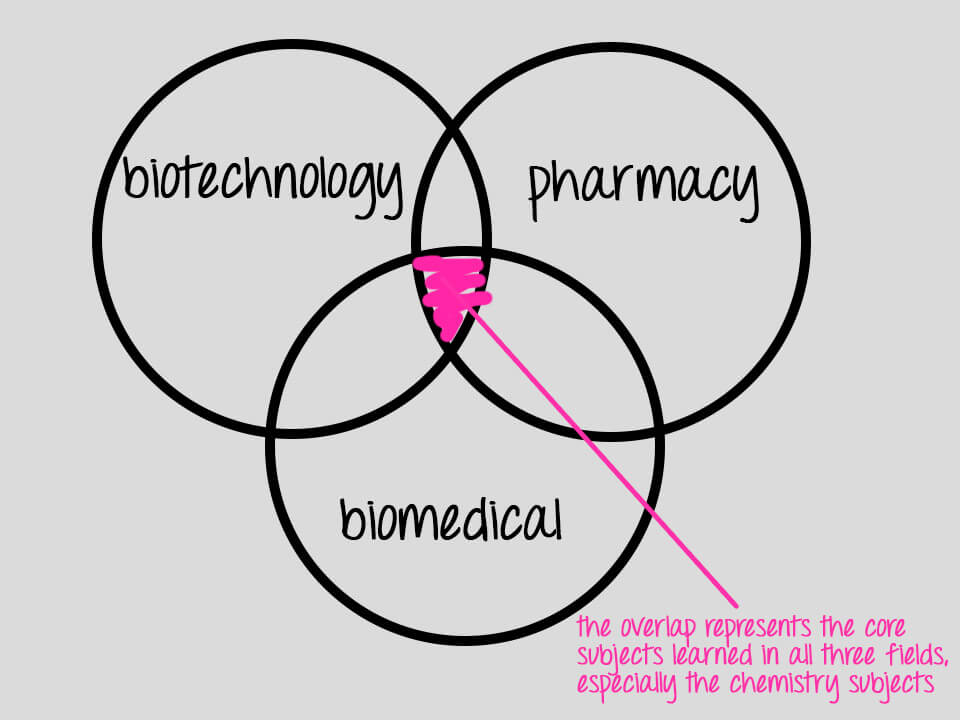
Based on the venn diagram above, I would like to share how to make comparisons between different fields of study. Usually one would compare the future job prospects, and that works fine. The other way to do this is by comparing the course outlines.
Course outline provides you the general information on how a program is structured9. This is the course outline for BSc. Biotechnology & Molecular Bioscience in RIT. From that course outline you’ll find what are the required core courses, the elective courses, lecture courses without laboratories, lecture courses with laboratories, and the general education subjects. For me, this is very useful to see how the program is designed, and what subjects I will learn during the period of undergraduate years.
And then, you can compare with other field of studies such as biomedical science, biochemistry, pharmacy, et cetera. To find a course outline it is actually pretty simple. Go google “course outline for bla bla bla”. For example,
- Biochemistry at Wisconsin-Madison
- Pre-Pharmacy at Penn State University
- Biomedical Science in UC San Diego
Eventually you’ll find out that some of the courses share the same foundation subjects, notably the chemistry subjects.
When you are in doubt, find the course outline.
molecular sledgehammer
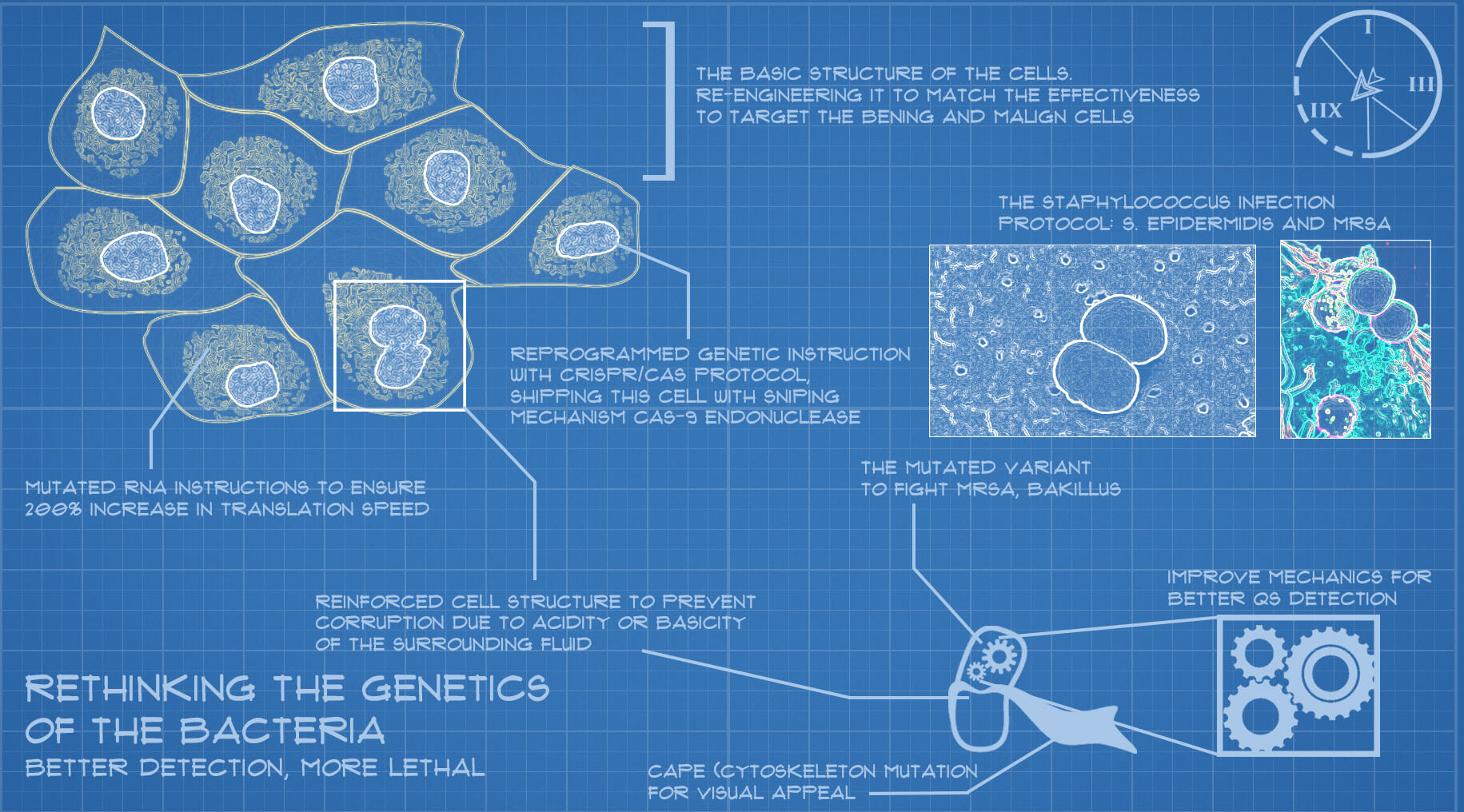
For a moment, let’s revisit the definition of the biotechnology: any technological application that uses biological systems, living organisms or derivatives thereof, to make or modify products or processes for specific use. So right now we are going to talk about the ‘technological application’ that defines biotechnology, thus focusing on the lab experiments and protocols.
When we talk about biotechnology, we talk about lab experiments, and we talk a lot about it. This section is going to be relatively bit more technical than the previous sections because I am going to discuss about a few famous lab experiments that we need to remember like it is at the back of our paw. Here is a short list of the important lab protocols:
- Polymerase Chain Reaction
- Gel Electrophoresis
- Bacterial Transformation
- Molecular Staining
- DNA and RNA extraction
- Restriction Enzyme Reaction
- Western Blot
- Centrifugation
This list can be absurdly long, but I don’t want this section to be your sleeping pill, because we have two more sections to cover after this section. I am only going to pick 3 protocols from the list above, and then share it with you guys what they do and their significance in the lab.
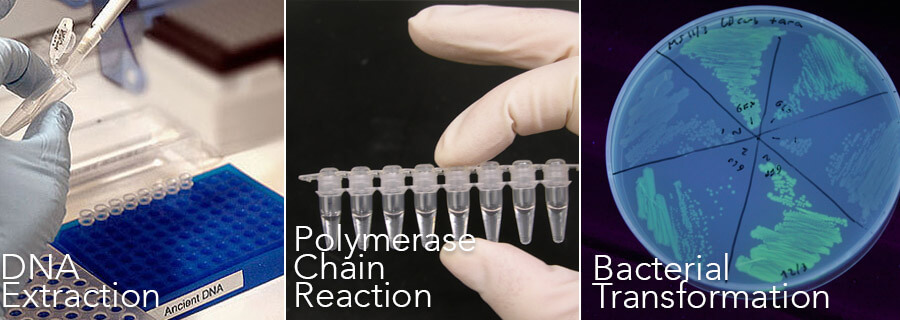
Polymerase Chain Reaction (PCR), in short, it is the lab protocol to multiply the amount of genetic material, the DNA. Assume that we have a very limited supply of DNA, say that around 1.0 mL inside a 1.5 mL microtube, but we need to run a very comprehensive DNA analysis, 1.0 mL might not be enough. We need more than that. So now we take about 0.1 mL DNA from that tube, and put it into 10 different microtubes, then we add some magic pixie dust into each tube, then run the polymerase chain reaction, we might end up with 1.0 mL times 10 more DNA than before, which is about 10 mL. We can do this over and over again, generating a very huge amount of that DNA.
This Wikipedia article on Polymerase Chain Reaction can be a useful resource for you guys to check. PCR has a very wide application in the realm of biology. Think it like a frying pan. You use the frying pan to cook variety of foods, and that’s what PCR in our realm. We use it for DNA fingerprinting (identifying the criminal based on the blood, saliva, sweat, semen), genetic testing and screening to check for genetic mutation, studying the development of an organism based on gene expression, among other things.
DNA Extraction is a process to crack open the cell, reduce everything down to nothing, only leaving the DNA as the end product. To study the DNA of an organism, first we must obtain the DNA, and usually we do it the hard way. We always punch the cell, kick it butts, put it at gunpoint, threaten it with chemical and biological weapons.
Except that we don’t literally kick, punch, and cuff ‘em. Just like stealing jewelries, we must find an opening to gain access into the house. Cells do have doors, but like I said before, we do it the hard way. We tear down the cell membrane, destroy everything that stands in our way, and finally we snatch the DNA. Head to this Wikipedia article on DNA Extraction to learn more about it.
Bacterial Transformation, to fictionally summarize this, think it like a car that suddenly has the superpower to transform itself into a giant robot, just like the… erm… Transformers?
Biologically speaking we supply the bacteria with genetic instructions, for example, giving it the ability to glow under UV light (pGLO plasmid), to produce banana smell (supplying the bacteria with gene that produces isoamyl acetate), making it resistant to antibiotics (ampicillin, kanamycin), among other things. I am sure there would be an article about this on Wikipedia, so go find it yourself this time.
“All these nerdy bio stuff… it must be dull, your days in the lab”
Yeah right…
Side note: What is iGEM? To briefly summarize what is iGEM (International Genetically Engineered Machine), it is a competition for undergraduate students, multidisciplinary and interdisciplinary, focusing on synthesizing cool biology stuff. For example this project “Fight Tuberculosis with Modern Weapons” by iGEM Team Paris Bettencourt, an attempt to revolutionize the way we fight against the tuberculosis, and at the same time making it cheaper to detect and annihilate the disease.
growing old with pipettes stuck to your palm
Welcome to the part, a part which I am not even sure how to write it, how to exactly phrase my thoughts, and how to tell others about my mixed feelings, my love-hate relationship with biotechnology: employability as a biotechnology graduate. Just before we jump into the topic, first I have to share about my relationship with science in general.
I am an ardent proponent of scientific advancement, well-pronounced with my achievement in science since I was in elementary school. There was a year I won the straight flush for the best student in science subject, then I replicated the success again during my high school years. During my final year in high school, I participated in the Young Teachers Program, being the peer tutor for science subjects, which were the Physics and Chemistry. After I graduated from high school I co-founded the continuation of the Young Teachers Program, which was the Young Professor Program (my parents still talk about this every time I am on Skype with them), teaching Physics and Chemistry.
After I got my grades, unfortunately I wasn’t able to pursue the field of engineering and MD/MBBS. That left me with other options such as optometrics, bioscience, biotechnology, among others. I did my homework (like… walking through a narrow alley, if you still remember that story), talking to friends, reading newspapers, meeting with people10. Finally, I applied for the scholarship to major in Biotechnology in the United States, and finally I am here.
When talking about hobby and killing free time, I would just say I am pretty good with modern machinery called ‘the computer’, and when a person says “I am good with computer”, expect a whole new level of skills that involves reading and writing gobbledygook, impenetrable code spaghetti.
What do these all things about me have to do with this section? I am in love with science, and I do biotechnology because of that.
How unfortunate. Passion alone will not grant you ease of access to a comfortable life. Repeatedly over and over again I heard stories that biotechnology graduates find difficulties to secure a well-paying jobs in Malaysia. The biotech boom back in 2005 and 2006 was a short-lived boom, the progress is glacial, and the biotech scene in Malaysia is not like breathing the warm sunny air at the beach, but it is like breathing during winter storm: the air is thick, difficult to breathe, and must wear layers of clothing.
But before that, let’s learn something first: the street lamp problem.
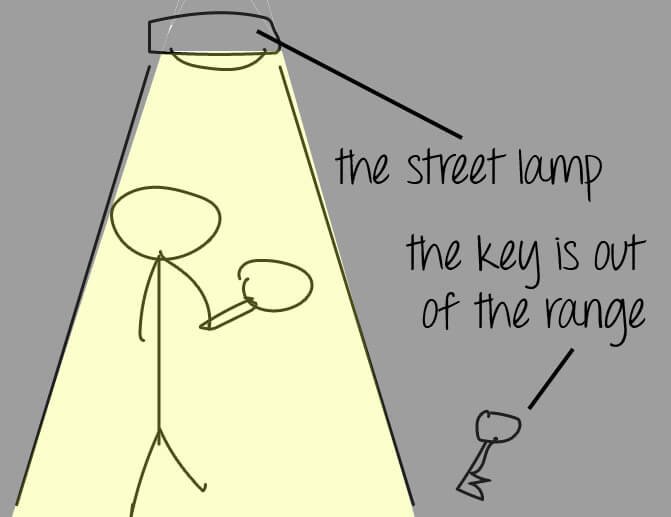
You are at the parking lot. You are about to (manually) unlock the car, but suddenly the wind is way too strong, it whips your hand and the key slides on street. The light from the street lamp shines your car only, not your surrounding. You try to find the key, facing difficulties because it is dark. Unbeknownst to you, the key just a few inches away from the car, but the absence of light limits your vision.
Being in the field of biotechnology with the aim to work in Malaysia, as far as my knowledge and information about job prospects are concerned, it is like fighting in a competition and the unemployment is the dark horse. I know less about the market growth in biotechnology, but that doesn’t mean the biotech scene in Malaysia is totally hopeless. The street lamp shines a very limited spot, so I have to extend my search in the ambiguity of darkness and uncertainty.
YOLO.
In the United States? Biotechnology is the new hype. Thanks to the advancement in synthetic biology, the open source science movement, the DIY Hackers movement, the concerted efforts by organizations, agencies, and the government. They are making the field of life science moving at a very convenient speed: not too fast, but fast enough for us to enjoy.
“So are you saying there are limited job openings in Malaysia?”
You can imply so, but with regard to the street lamp problem, we don’t know what we actually don’t know. But here is a thing, we can always defy the street lamp problem.
Bring torchlight.
If that sounds archaic, use your phone’s flash. If it is dark, cut open a new path by yourself. Or if you don’t have it, wait till the morning sun, i.e., playing safe and wait for another biotech boom in Malaysia.
To answer the question “what a student with biotechnology degree can do?”, head to these links:
In short, we do experiments. Research assistant, lab technician, scientist… you name it.
Swiss Army Knife
And finally, the conclusion. It has been days I’ve been writing this article. Well actually I got sidetracked with some coding stuff, and I played DotA 2 a lot. Sidetracking things that sidetracked me was a difficult one. It was like fighting against dragons and hyenas without steel pants and armor plate. The only equipments I had were the pitchfork, flaming torch, and a spoon.
Oh wait.
In this final section, I am going to share with you guys some advice (if you guys are still here). The future is fraught with ambiguity and uncertainty. You must fight to get a better future, but you won’t last long if you only have pitchfork, flaming torch, and a spoon.
“What does that mean bro?”
The phrase “pitchfork and flaming torch” signifies that you always complaining, not satisfied with your life, and always revolt. That doesn’t actually do any good, because you are engaging in a negative contribution. What about spoon? Easy. You wait to be spoon-fed.
Mindblown? Mindblown?
You need more than just pitchfork, flaming torch, and a spoon. You need a swiss army knife. For example, I am a biotech student with the skills to perform laboratory experiments. I also possess set of computer skills, I am quite good with networking skills, and sometimes I can lead the group to achieve goals. That’s my current swiss army knife.
Over the time, we need to add more tools to our swiss army knife.
“How?”
We start with reading.The more you read, the more you know what kind of swiss army knife you need, and this graph concludes my article.
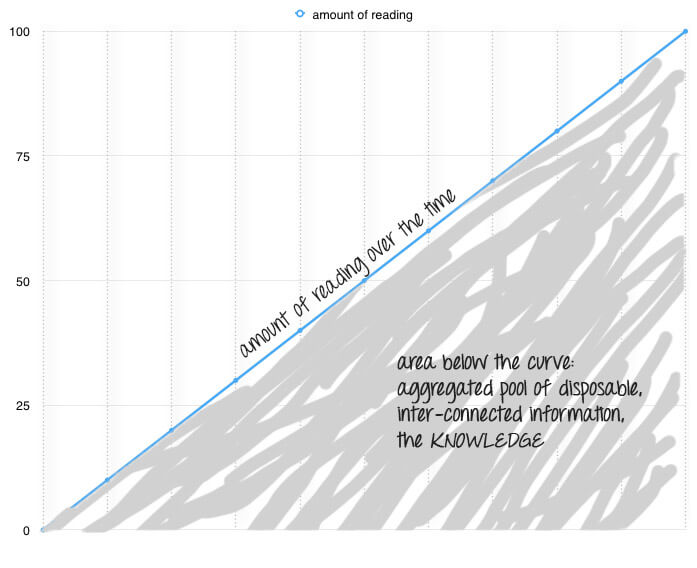
“But bro, I have a question for you. Why the article’s title?”
Your passion to major in biotechnology has to be a fiery one, till it burns everything that surrounds you, and you are still there.. smiling, inoculating the bacteria. Also, when it’s burning the surrounding air is blown out of contaminants. Sterile technique ftw! You save on bunsen burner cost too.
Footnotes
-
July 2012, this was the biggest news in the field of physics because the researchers was close to confirm the missing piece of the Standard Model. Read here. ↩
-
Wet laboratories are laboratories where chemicals, drugs, or other material or biological matter are handled in liquid solutions or volatile phases, requiring direct ventilation, and specialized piped utilities (typically water and various gases). ↩
-
Hard sciences = engineering-ish fields. In biotech, we engineer the cells, and enslave them, making them our minion. OK kidding. characteristic of hard science include producing testable predictions, performing controlled experiments, relying on quantifiable data and mathematical models, a high degree of accuracy and objectivity, and generally applying a purer form of the scientific method. Read more here. ↩
-
Nowadays biotechnology is often associated with the development of drugs. Years ago, it was about finding better way to ferment beer (industrial fermentation). Read more here. ↩
-
The term biotechnology is defined here: Convention on Biological Diversity, Article 2. ↩
-
CHEMIK 2012, 66, 8, 811-816, accessible here from aixnr’s fileserver. ↩
-
By far the most important industrial use for new gold is in fabrication of corrosion-free electrical connectors in computers and other electrical devices. Read more here. ↩
-
Reminds me of the TEDxDeExtinction. My presentation when I was in INTEC back in 2013 was about this TEDx, and I named it as “The Tale of Scientific Necromancy” ↩
-
McGill University has a webpage that gives you the information on how to write a course outline. Read more here. ↩
-
Some of them discourage me from taking MD/MBBS, because “you might be better off for something else”, and I swallowed that advice. ↩